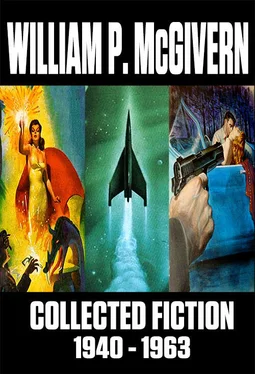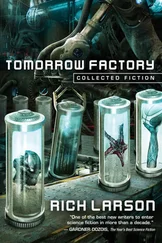Уильям Макгиверн - Collected Fiction - 1940-1963
Здесь есть возможность читать онлайн «Уильям Макгиверн - Collected Fiction - 1940-1963» весь текст электронной книги совершенно бесплатно (целиком полную версию без сокращений). В некоторых случаях можно слушать аудио, скачать через торрент в формате fb2 и присутствует краткое содержание. Год выпуска: 2014, Издательство: Jerry eBooks, Жанр: Ужасы и Мистика, Фантастика и фэнтези, Детектив, Прочие приключения, на английском языке. Описание произведения, (предисловие) а так же отзывы посетителей доступны на портале библиотеки ЛибКат.
- Название:Collected Fiction: 1940-1963
- Автор:
- Издательство:Jerry eBooks
- Жанр:
- Год:2014
- ISBN:нет данных
- Рейтинг книги:3 / 5. Голосов: 1
-
Избранное:Добавить в избранное
- Отзывы:
-
Ваша оценка:
- 60
- 1
- 2
- 3
- 4
- 5
Collected Fiction: 1940-1963: краткое содержание, описание и аннотация
Предлагаем к чтению аннотацию, описание, краткое содержание или предисловие (зависит от того, что написал сам автор книги «Collected Fiction: 1940-1963»). Если вы не нашли необходимую информацию о книге — напишите в комментариях, мы постараемся отыскать её.
Collected Fiction: 1940-1963 — читать онлайн бесплатно полную книгу (весь текст) целиком
Ниже представлен текст книги, разбитый по страницам. Система сохранения места последней прочитанной страницы, позволяет с удобством читать онлайн бесплатно книгу «Collected Fiction: 1940-1963», без необходимости каждый раз заново искать на чём Вы остановились. Поставьте закладку, и сможете в любой момент перейти на страницу, на которой закончили чтение.
Интервал:
Закладка:
“I can get into the warehouse,” the little girl said proudly. “I’ve watched Gramps do it ever so often.”
“How?” Dan asked, watching her shrewdly.
“Well, there’s a box in his house with levers in it. He pulls a lever and the door of the warehouse opens. But he can only pull it at a certain time, or else a message goes out somewhere and warns somebody that it isn’t Grampa pulling the lever but somebody else.”
“I see you’ve got a good pair of eyes,” Dan said, with a glance of amused triumph at Willie.
“And also,” the little girl said in the same proud voice, “he has to keep his hand inside the box a certain length of time before he takes it out. Otherwise, if he didn’t, that would send out a message too.”
“Some kind of an electric eye and radar business with a timer on it,” Dan said, nodding at Willie. Then he looked searchingly at the little girl. “Can you do this while your Grampa is taking a nap or something?”
“I think so,” she said.
“You don’t want the bad men to kill him, do you?”
“Oh, no.”
“Well, be careful then. Be sure he’s asleep. Now do you have any questions? You know where the igniter is, and you know where the short-term ones are. Get into the warehouse, grab a long-termer and get back here as fast as you can. All right?”
“Yes, we’ll hurry.”
A short distance from the house the little girl stopped and looked sternly at Johnny, who was weeping. “You know what to tell your Grandfather, don’t you?”
“Don’t make me lie to him, Lucy.”
“You must.”
“They’re bad men. You’re helping them get away. And you’re making me lie again.”
“Do you want me to go away and never come back?”
“No, but I don’t want to be bad.”
“Very well. What will you tell your Grandfather?”
The little boy gulped and drew a trembling breath. “That I fell down and that’s why I’ve been crying.”
“And what else?”
“That I want to rest for a while, and for him to read to me.”
“Good, don’t forget any of it,” the little girl said.
Old John was alarmed to see his grandson crying. When he heard what had happened he took the boy inside and gave him a glass of milk. He was greatly surprised when Johnny told him he wanted to lie down and have a story read to him; that just wasn’t like the boy. But he led him upstairs to his room, made him comfortable with a pillow, and began to read to him in his slow, patient voice.
Downstairs the little girl walked to the cabinet against the wall, opened it and stared solemnly at a panel of levers. Then she glanced at a clock above the mantle, her lips moving silently, and stood perfectly still for several moments. Drawing a deep breath at last she reached quickly into the cabinet and pulled a lever. She held onto it for ten seconds, then withdrew her hand and ran outside. The main door of the warehouse stood open. Smiling happily, the little girl darted inside, as quick as a bird on the wing...
“Johnny!” she called later in her sweet high voice. “Johnny, are you feeling better?”
She stood before old John’s house, her feet turned inward, her small golden head tilted to one side, a picture of innocent childhood. The two bulges in her pockets were obscured by the way she was hugging herself with her thin arms.
“Johnny!” she called again. “Come out and play.”
The little boy came quickly through the door, his grandfather trailing after him with a worried little frown on his little-boy face.
“I guess he’s chipper enough,” old John said. “But he acts like he hurt more than his knee with that fall.”
“I’ll make him happy again,” the little girl said. “Come on, Johnny, let’s play.”
“I don’t want to play,” he said. “Don’t be such a goose. Come on.”
Holding his hand she drew him reluctantly toward the rows of great ships.
Dan was waiting on the platform of the ship with Willie. The two men stood perfectly still, staring down at the empty street. Only their eyes gave away their inner desperation.
“You better be right,” Willie said.
“It’ll work, it’s got to work,” Dan said. “She’s a smart little gal. In fifteen or twenty years we could use her.”
“You got faith in the future, eh?”
“I haven’t lost it. We'll blastoff here and find a spot. And find others like us. And we’ll live like we want, fight like we want. Don’t worry, we got futures.”
Suddenly they heard the little girl’s voice, and the figures of the children came into sight around the corner formed by the hull of the adjoining ship.
“We got it, Dan,” the little girl cried, waving at the two men.
“Get inside and get ready,” Dan snapped to Willie. “I told you we had futures.” He ran down the ladder and grabbed the igniter cylinder from the little girl’s hands. “Thanks, kid,” he said, looking at both of them with his narrowed, thoughtful eyes.
“You’re welcome,” the little girl said. “We must hurry back now.”
“Just a minute,” Dan said smiling thoughtfully at her. “I got a little present for you in the ship.”
“Oh, goodie,” the little girl said, clapping her hands together happily. “You hear, Johnny? We can show it to the man?”
“What man?” Dan snapped.
“The one I told you about the other day,” the little girl said patiently. “The one asking us about you. He was ever so nice. And he came back today. We’re playing a game with him now. It’s called hide-and-seek. Would you like to play?”
Dan looked quickly up and down the shadowed street, then turned and ran back up the ladder. He disappeared into the ship and the door closed behind with a soft rush of power.
“They’re going away now,” Johnny said, sobbing. “You helped them, Lucy. They’re bad and you’re bad too.”
The ship suddenly trembled and moved upward from the ground. It hovered fifty feet in the air and glowing lights appeared in the cones of the rear propulsion rockets.
“You’ve helped them get away,” Johnny said, weeping and stamping his feet on the ground. His round, apple-cheeked face was frantic with misery. “You’re bad, Lucy! I hate you!”
The little girl caught him to her and hugged him with her thin arms. “No, don’t say that,” she cried softly. Her eyes followed the ship as it roared out of the atmosphere, trailing a crimson train of hot, blue-white fire in its wake.
“Let me go, I hate you,” Johnny cried. He pulled away from her but she caught him once more and forced the red rubber ball into his chubby hands. “Keep this, Johnny, please.”
But the little ball meant nothing to him now. He threw it away and ran down the street, his fat little legs taking him away from her forever; his eyes were blind with tears.
The little girl stared after him through the growing darkness. She looked tiny and lost among the towers formed by the great ships. Then, sighing, she turned and walked in the opposite direction. When she came to a ship whose landing ladder was down, she went aboard and marched to the control room. Opening a heavy, lead-lined door she thrust a black cylinder into an empty receptacle, and then sat down facing the flight panels and visi-screens. She spread her skirt out prettily and then threw two switches.
The ship began to hum with power.
She spoke one word. “Venus.”
A voice answered. “We have you here. Results?”
“Excellent,” she said. “They’ve blasted-off with a short-term igniter. I expect they’ll explode within an hour. See you at 22-xc. I’ll be on the usual pattern.”
“Any trouble at all?”
She hesitated. Then: “No, nothing at all. I gave them a short-term igniter and kept a good one for myself. I could have had help from Earth but this seemed less dangerous.”
Читать дальшеИнтервал:
Закладка:
Похожие книги на «Collected Fiction: 1940-1963»
Представляем Вашему вниманию похожие книги на «Collected Fiction: 1940-1963» списком для выбора. Мы отобрали схожую по названию и смыслу литературу в надежде предоставить читателям больше вариантов отыскать новые, интересные, ещё непрочитанные произведения.
Обсуждение, отзывы о книге «Collected Fiction: 1940-1963» и просто собственные мнения читателей. Оставьте ваши комментарии, напишите, что Вы думаете о произведении, его смысле или главных героях. Укажите что конкретно понравилось, а что нет, и почему Вы так считаете.

![Уильям Макгиверн - Завтра опять неизвестность [английский и русский параллельные тексты]](/books/35168/uilyam-makgivern-zavtra-opyat-neizvestnost-angli-thumb.webp)









